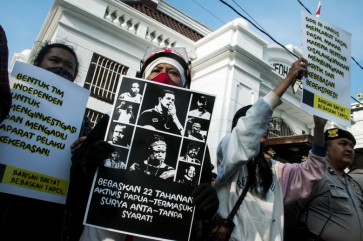Popular Reads
Top Results
Can't find what you're looking for?
View all search resultsPopular Reads
Top Results
Can't find what you're looking for?
View all search resultsPapuan political prisoners: Broken promises, broken lives
The way the Papuan problem is dealt with is a serious test for the nation — and Jokowi’s second term in office. Indonesia’s democracy is said to be at its lowest in 20 years. It’s often the government apparatus that violates its own laws and tramples on the civil, political and human rights of its own people.
Change text size
Gift Premium Articles
to Anyone
 The way the Papuan problem is dealt with is a serious test for the nation — and Jokowi’s second term in office. Indonesia’s democracy is said to be at its lowest in 20 years. It’s often the government apparatus that violates its own laws and tramples on the civil, political and human rights of its own people. (Antara/Novrian Arbi)
The way the Papuan problem is dealt with is a serious test for the nation — and Jokowi’s second term in office. Indonesia’s democracy is said to be at its lowest in 20 years. It’s often the government apparatus that violates its own laws and tramples on the civil, political and human rights of its own people. (Antara/Novrian Arbi)
Do you remember when you were a child and your dad made a promise he didn’t keep? You felt pretty crushed right?
Well, you don’t have to be a child to feel let down by a broken promise.
A promise is a commitment to do or not do something. Different kinds of promises include: personal and professional ones, solemn promises like marriage vows, the Hippocratic Oath for doctors, the military oath, allegiance to the nation, etc., and election promises.
Then there is the promise that states make when they sign international agreements. Thirteen years ago, on Feb. 23, 2006, Indonesia ratified the International Covenant on Civil and Political Rights (CCPR).
“Indonesia is a nation based on law and since its founding in 1945, strongly upholds the principle of human rights,” is the first sentence explaining why it ratified the CCPR. So clearly, the state made a promise to uphold the civil and political rights of all its citizens.
So why doesn’t it?
The detention of six activists of the Indonesian People’s Front for West Papua (FRI-WP) — Surya Anta Ginting, Charles Kossay, Dano Tabuni, Isay Wenda, Ambrose Mulait and Arina Elopere — is a case in point.

















